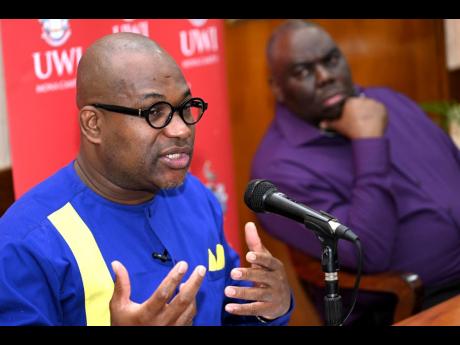UWI to revise fee structure for on-campus commercial outfits
Commercial entities that operate on The University of the West Indies (UWI), Mona campus, will soon face an increase in fees as the university revamps its rate structure to align with market dynamics.
This move, as well as a review of its self-financed programmes, is expected to generate at least $1 billion for The UWI Mona’s coffers for the aggregate year 2024-2025, its principal, Professor Densil A. Williams, disclosed.
Speaking with journalists during a press conference yesterday, Williams, who assumed principalship of the institution on August 1, 2023, stated that these are critical short-term measures that form part of a restructuring of the business processes and organisational design of The UWI, Mona, to derive greater levels of efficiency and to streamline the revenue-generating areas of the campus.
“The transformation requires a new ethos going forward, and this new ethos will start with a re-centring of the operation of the campus to focus on the core business of the academy for teaching and learning, research and innovation, and thought leadership,” he said.
“We rent out our facilities to places like Burger King, KFC, and all of those kinds of people. So we have to look at the fee structure for those as well and make sure that they are also competitive,” Williams shared.
However, he noted that consideration will be given to the buoyancy of The UWI’s market when considering the rate of increase for these commercial entities.
“As a university campus, we are at our peak during our semester period but, during the summer period, we are at a lull as well and, as a result of that, your prices have to reflect that volatility in the market,” he said.
And, while disclosing that some programmes offered by The UWI are “exceptionally underpriced”, Williams said a deeper analysis of its self-financed courses will need to take place to ascertain the possibilities for increasing fees.
He stressed, however, that there is no guarantee the prices will be increased as “those fees are fees that have to be approved by the University Council”. In the event an increase is granted, he said, efforts will be made to keep the figure within the realm of the current inflation point.
UWI’s Financial woes
The UWI, which is funded by regional governments, has consistently lamented its financial woes. The originally agreed principle was that the governments would cover 80 per cent of the cost of running the institution – or at rates that merely kept pace with inflation. However, at least in Jamaica’s case, the government, each fiscal year, allocates to The UWI a dollar amount that does not necessarily equate to a specific funding formula, but what the administration believes it can afford.
The university’s leadership has often touted its vision for the financial reliance model of the university to change, with less dependency on the public.
“The financial issues of the past have really preoccupied us for a long time, but we have to get beyond those and ensure the campus continues to focus on building the relevant human capital to propel national, regional and global developments,” he said.
To further address this, Williams said the institution will also embark on a restructuring of its balance sheet, to free up more liquidity.
“We really hope that, having restructured our balance sheet within the very short term, we’re able to at least save about $400 million annually,” he said.
Additionally, he said, efforts will also be made to monetise the institution’s physical assets to generate revenues and reduce cost. As an example, he pointed to the potential revitalisation of the housing stock at College Commons, which he said should save The UWI $100 million annually.
In addition to these short-term measures to increase the university’s liquidity, Williams said long-term projects to further enhance the university’s position are also taking shape.
These include the establishment of a global school of health, leveraging its intellectual resources through knowledge process outsourcing for global competitiveness, and the formation of an institute for short-cycle courses catering to industry demand and skill enhancement.
Facilitating balanced development
“As a campus, we’re mindful of our role as a major player in the creation of human capital to support the national, regional and global development of our society. Therefore, we will position the campus, using our skills and capabilities and through partnership with industry, the government and other players … to ensure that we facilitate balanced development for all,” he said.
Through the support of the private sector, Williams said The UWI will be designing and supporting a programme of thought leadership to bring cutting research and innovation from the university to the wider public.
The UWI, he said, will also be undertaking various infrastructure upgrade programmes, which he said will be funded through monies raised through its core operation, and partnerships with mulilateral agencies and private sector entities.
“Despite the challenges, there is a lot of hope, based on tremendous opportunities that lie within our internal and external environment, that are waiting to be harvested. The UWI team is seized of these opportunities, and, having carefully analysed the environment within which we operate, we are ready to harvest those opportunities,” he said.

